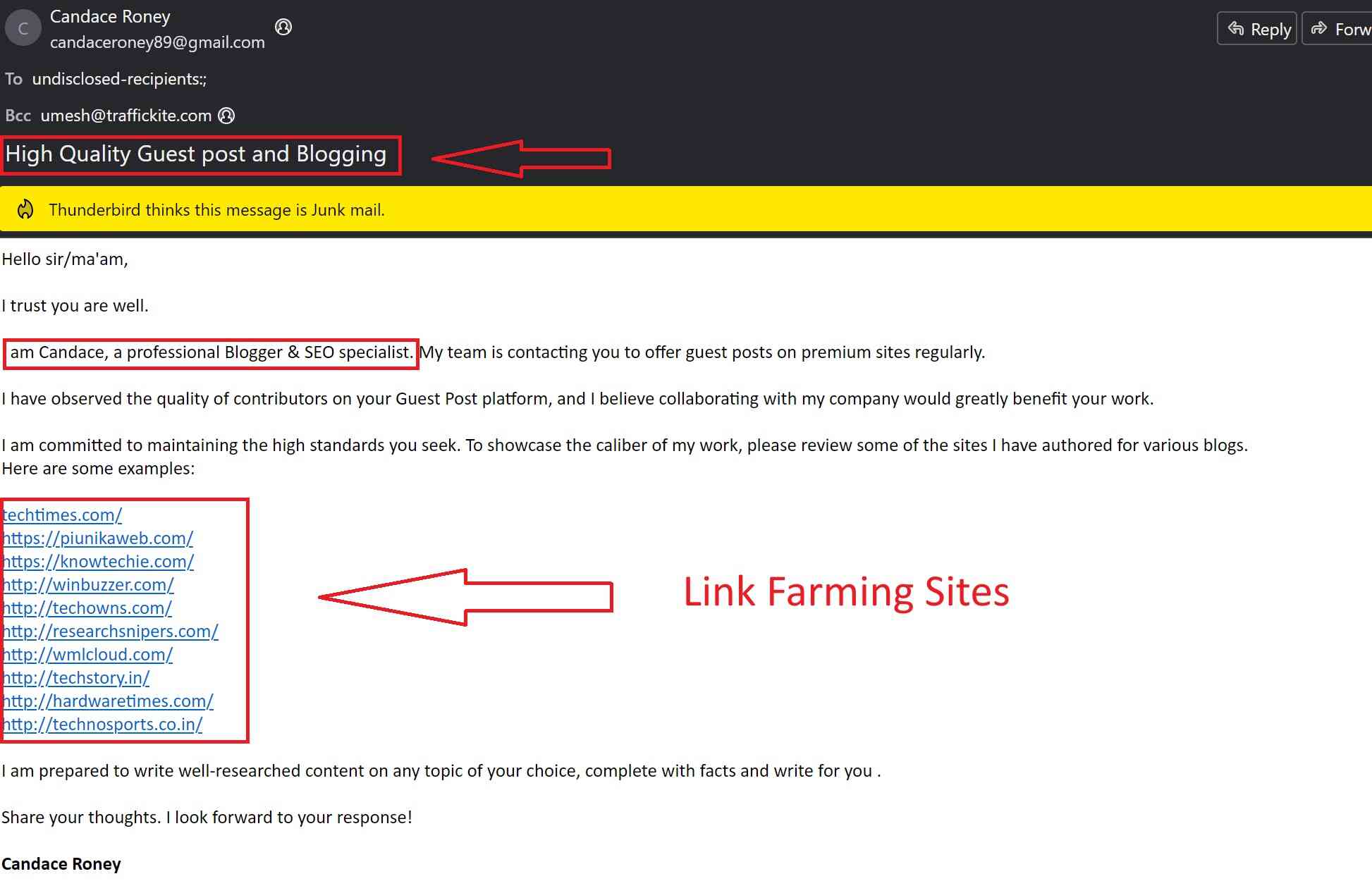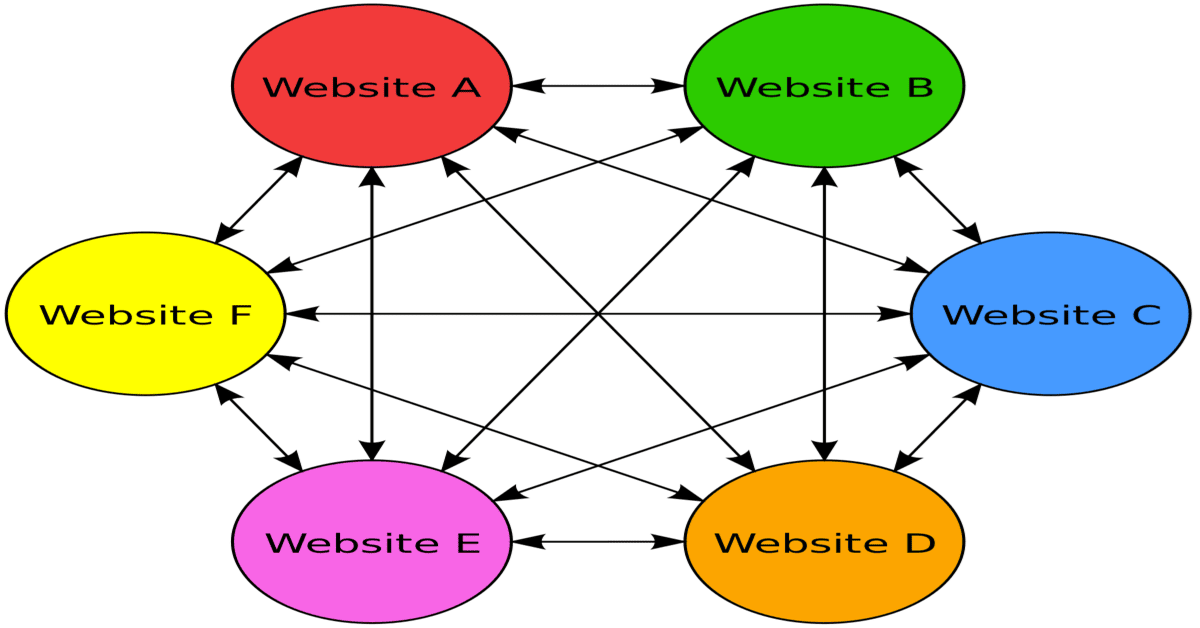What is Link Farming?
Link farms are websites that have only one purpose – creating links to other websites. These websites aren’t here to provide any valuable content or useful information.
Instead, they are a group of phony, low-quality sites that give backlinks to other sites for monetary compensation.
Have you ever encountered people who promised to give you hundreds of backlinks and increase your site’s search engine ranking by leaps and bounds within a short time?

Well, they are probably using link farming to achieve that. After all, such a “high value (pun intended)” cannot pop out of thin air.
In short, link farming is a questionable SEO technique to use a group of sites to provide your website with tons of backlinks.
Now, in Google’s eyes, it’s a black hat tactic that tries to increase your search engine ranking using artificial means.
So, if your site has a lot of backlinks from these suspicious link-farming sites, your website’s search engine ranking will plummet by a huge margin in the long term.
How Does Link Farming Work?
The link farm owners simply see this as an easy way to make money without caring about the content quality. These people will try to sell as many links on their sites as possible.
Here are some common black hat tactics the link farm owners use:
A) Reciprocal Linking: When two or more sites start linking each other’s web page to build backlinks, we call it reciprocal linking. It’s like two sites saying, “You link me, and I will link you” to each other.
While it’s not a bad thing, Google clearly replied with a big “NO” to excessive reciprocal linking. However, these link spam sites usually do just that. They use way too many reciprocal links to generate more traffic in a short time.
B) Spamming: Many link farms have a wide range of unrelated categories. They might try to sell you hundreds of backlinks by linking your web pages to unrelated, low-quality posts and pages to manipulate your website’s search engine ranking.
C) Using Automated Tools: These sham websites might also use automated content generation tools to spin out poor-quality content.
Now, why would they do that?
Of course, to add links to your web pages to these poorly written blogs, press releases, or guest posts in the name of generating backlinks for you.
Is Link Farming Good for SEO?
As we have mentioned before, link farming is a black hat SEO tactic, and Google hates it.
If Google algorithms catch you using link farms(and believe us, it will), your site will see a huge drop in its organic traffic.
The search engines might go as far as removing your site from search engine indexes.
So, if you want to improve your site’s SEO ranking, stay as far away as possible from these sites.
However, we still see some SEO agencies use link farms. Now, you may ask why they would do something like this if it’s bad for SEO.
Well, even if Google is quite proactive, it can’t possibly identify all unnaturally built links if the SEO agencies use these spammy sites sparsely. And there are many industries, such as gambling, adult, and loan, that find it hard to build natural links.
So, they still use them, even though it’s a black hat SEO technique. But make no mistake. Google will still penalize them, sooner or later.
7 Ways to Detect Link Farming Activities
Even though you know what link farming is, it might still be hard for you to detect these shady sites. But to avoid them, you need to learn how to identify them.
Here are seven ways to detect if any site is using link-farming activities:
1. A Basic Website Design
Most owners of link farms don’t usually spend much time, money, or effort to design their websites. Normally, they use basic web designs or templates that they get from the hosting platforms after making a few minimal tweaks.
On the other hand, reputable site owners use a lot of time to customize their web designs and opt for high-quality templates.
They do it to increase the overall user experience of the readers.
2. Spammy Domain Names
Have you ever come across sites with weird domain names filled with irrelevant words that make little to no sense? That’s what we call spammy domain names.
Suspicious sites like link farms often use spammy domain names that have no clear relevance to their web content.
So, the next time you see a website with a spammy domain name and a lot of irrelevant content, stay away from it.
3. Poorly Written, Irrelevant Content
The link farm owners don’t care about their sites’ content quality. After all, they are publishing articles not to help the readers, but to sell and create links to other sites.
So, the articles and web content of these sites are often very poorly written. Most of their blog posts are short, cheaply crafted, and irrelevant.
4. Anonymous Authors
The owners of these sham sites don’t want to be associated with these sites. So, they publish their posts under anonymous author names.
The most used anonymous author names on these sites are:
- Guest writer
- Team [website name]
- Guest contributor
5. Irrelevant Anchor Texts
Link farm owners only have a single target – to sell and produce as many links to other sites as possible. They don’t care about anything else.
So, you will see a lot of irrelevant anchor texts on these sites that often lead to completely unrelated websites.
6. Unnatural Link Patterns
Since they only care about selling links, these suspicious sites don’t have any specific link patterns. They can dump a lot of links in a single blog post or add guest posts to target specific types of links.
Their posts often build links to irrelevant websites with a messy black hat link-building strategy.
7. Sudden Spikes in Backlink Volume
If you’re using SEO tools like Semrush or Ahrefs and see sudden spikes in backlink volume on a site frequently, that site is probably a link farm.
The goal of owners of these spammy sites is to sell as many links to other sites as possible, even at the cost of the site crashing and being black-listed by Google soon.
So, if you’re monitoring these sites, you will often see a sudden increase in the number of backlinks to other sites from time to time.
Why Does Google Hate Link Farming?
By now, you should have a good understanding of what link farming is.
You should be able to tell that it’s not good for your site’s SEO health at all. So, if you’re building contextual backlinks using these suspicious sites, it would be bad for your website in the long term.
Google released an update called SpamBrain in December 2022 to invalidate all backlinks established using link farms. It means if you have backlinks from these sham websites, Google will completely ignore them.
In fact, if you’re deeply involved in reciprocal linking with these sites, Google can even penalize your website.
Google may deem it as if you are paying to get those links using black hat tactics that can even lead to complete de-indexing of your site from the search engine ranking.
Why Do Link Farm Sites Have High Domain Authority?
Just because a site has a high domain authority or DA doesn’t mean it’s reliable. It can very well be a link farm.
The owners of these sites often use multiple tricks to keep their sites’ DAs high. Even though the sites have low-quality, irrelevant content, the SEO tools will still be tricked to show a high DA score.
Now, you might ask – how do they do it?
Here are a few reasons why the DA scores of the link farms are high:
- They built the site using an expired domain name that had a very high DA score.
- The link farms were once very reputable sites that provided real value in the past. However, the site owners are publishing poor-quality blogs right now to seek more profit by selling links.
- The site is part of a private blog network that is trying to increase its domain metrics using manipulative link-farming tactics.
However, there’s a twist. Even though SEO tools are unable to detect link farming activities through domain rankings, Google’s search algorithms know how to detect spam sites accurately.
So, these sham sites will still receive proper penalties for their underhanded actions.
What are the Effects of Link Farms on SEO?
Now you know that Google hates black hat activities like the usage of link farms. So, if you get involved with them, knowingly or unknowingly, it would be really bad for your site’s SEO.
Here are a few negative effects link farming would have on your website’s SEO:
1. Search Engine Ranking Penalties: Google penalizes all forms of manipulative black hat tactics. And that includes using link farms too. So, if Google’s ranking algorithms find you using these black-hat link-building sites, your SEO score and search engine ranking will suffer.
2. Reputation Damage: If your users get to your site using irrelevant links from these spammy sites, they might think that you’re operating your business unethically. It would result in irreversible damage to your site’s reputation.
3. Poor Traffic Quality: Even if you get a lot of backlinks, the chances are that the traffic that will come from the link farms’ links would be irrelevant to your website’s niche or business. Since these users didn’t intend to come to a website that offers products or info similar to yours, they would probably leave quickly.
4. Potential Search Engine Bans on Your Site: If your website is deeply involved with them, search engines might remove the indexes from your web pages and ban your site. This way, no one will be able to find your website on the SERPs ever again.
5. Loss of Users’ Trust: If you use reciprocal linking with the link farms and your site users end up redirected to these phony, low-quality sites, they will quickly lose trust in your website.
5 Ways to Protect Your Website from Link Farms
Here are five ways you can protect your website from link farms:
1. Conduct Regular Link Audits: You can use SEO tools to conduct link audits every once in a while. You should monitor the new backlinks your site is getting and trace them back to avoid these sham sites.
2. Choose Your Links Wisely: It’s okay to add links to other reputable sites. However, if you have any doubts about the source, you can use no-follow tags while linking them to your site. This way, you indicate to Google that you don’t trust the linked site.
3. Build Organic Backlinks: Never buy backlinks. Keep publishing informative content and let your site generate backlinks organically. One quality organic backlink is way better than ten low-quality ones.
4. Learn the Difference Between Directories and Link Farms: A directory keeps a collection of high-value, informative topics in an organized manner.
Meanwhile, link-farming sites have poor content that is created just to generate and sell links. On the other hand, getting links from directories is good for your website’s SEO.
So, it’s crucial to learn how to identify the difference between these two.
5. Disavow Suspicious Links: If you think that you got a backlink from a suspicious site, you should immediately disavow them.
Are You Ready to Protect Your Website from Link Farming?
If you’re new to the world of SEO, it can be quite challenging to learn how to build quality backlinks and improve your site’s search engine ranking.
The link farm owners target people like you, promising to improve your site’s ranking in SERPs quickly by providing hundreds of backlinks.
Do not fall for them.
Instead, you need help from a reliable SEO agency that uses ethical white hat tactics to build links and bring organic traffic to your site.
At Traffic Kite, we use the magic of high-quality links and reliable domains to help your site drive high-quality, organic traffic faster than your competitors. All while protecting your site from the grasp of suspicious link farms.
The result is more organic traffic, improved brand credibility, a loyal customer base, and ultimately, better revenue.
Ready to ramp up your online business? Contact our SEO experts at Traffic Kite today!
Conclusion
By now, you must have a clear idea of what link farming is and why you should avoid it like plague.
If your site gets involved with link farms, knowingly or unknowingly, not only will Google penalize your site heavily, but you will also lose your users’ trust.
In short, it’s not worth it!
Link Farming: FAQs
#1 Is link farming legal?
Technically speaking, it is legal as there are no laws against link farming. However, Google and other search engines have adopted harsh policies against it. So, if the search engines find you using link farms, your site might receive severe penalties.
#2 How can I identify if my website is involved with the link farms?
You can use SEO tools to check your backlink records to see if you’re involved with these suspicious sites. You can conduct a backlink audit regularly and see if you have a lot of backlinks from any site out of nowhere.
If you’re not proficient in such tasks, you can outsource it to an SEO expert or your SEO agency.
#3 Are there any benefits to link farming?
No. It won’t benefit your site in any way. Instead, it can tarnish your site’s reputation. Google and other search engines might even impose severe penalties on your website.
#4 What are the other things I can do instead of link farming?
You can do the following things to improve your website’s SEO:
- Guest Blogging
- Creating high-quality, informative blog posts
- Influencer outreach
- Using ethical white hat link-building strategies
#5 Can I get out of Google’s penalty for link farming?
Yes, you can. To recover from Google’s penalty for using link farms, you can:
- Disavow low-quality links
- Clean up the backlinks you get from these spammy sources
- Make sure your site follows Google’s guidelines
- Ramp up your content quality
- Submit a reconsideration request to Google after you’re done cleaning up the bad links







Leave A Reply
You must be logged in to post a comment.